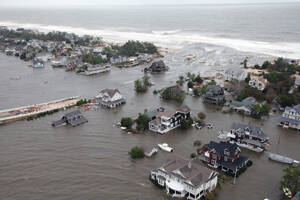The link between respecting the environment and the sacramental life of the church is inseparable for one bishop, who oversees a diocese that encompasses a collection of small islands in the South Pacific. When Bishop Bernard Unabali of Bougainville, Papua New Guinea, baptizes a new member of the church or confirms someone or even when he ordains a priest, he asks individuals to plant 10 trees as a way to give rise to new life.
“[I] use this situation,” Bishop Unabali told participats at a symposium in Washington, D.C. on Nov. 8, “which is going to be affecting us more drastically than probably in the past, to help people recapture our relationship to the environment.”
Bishop Unabali’s diocese includes the Halia people of the Carteret Islands. As ocean waters slowly overrun their atoll communities, more than 700 Halia are widely believed to be the world’s first climate refugees. The bishop said the remaining Halia are coping with diminishing land, but that he expects that within decades all will be forced to live elsewhere.
The symposium, hosted by The Catholic University of America, brought together Catholic theologians and philosophers to discuss the implications of Pope Benedict XVI’s biblically based ecological vision for the church. The symposium was sponsored by the U.S. Conference of Catholic Bishops, the Catholic Coalition on Climate Change and C.U.A.’s Institute for Policy Research and Catholic Studies.
The symposium began just over a week after Hurricane Sandy, the largest and second costliest Atlantic hurricane on record, devastated portions of New York, New Jersey and other states along the U.S. East Coast. The reminder of nature’s destructive potential was not lost on symposium participants.
Sandy came up “as an example of what we might expect more of as the planet warms,” said Dan Misleh, executive director of the Catholic Coalition on Climate Change. He added, “There is no way to argue a clear connection between climate change and events like Sandy; however, most scientists believe that climate change has a multiplier effect on such storms,” droughts and other adverse climate events.
According to Misleh, the scholars agreed “that the Catholic community is very fortunate to have the tradition of Catholic social teaching and a pope who highlights environmental stewardship and sustainability to help us see a way forward in educating more Catholics on these issues.” He said that while serious scholarship needs to continue on climate change, it must be made accessible through educational outreach. Catholics, according to Misleh, should embrace an ethic of eco-stewardship that is consistent with church teaching and Benedict’s leadership. “This is not some fringe teaching,” he said, “but a core part of who we are and ought to be as Catholics.”








